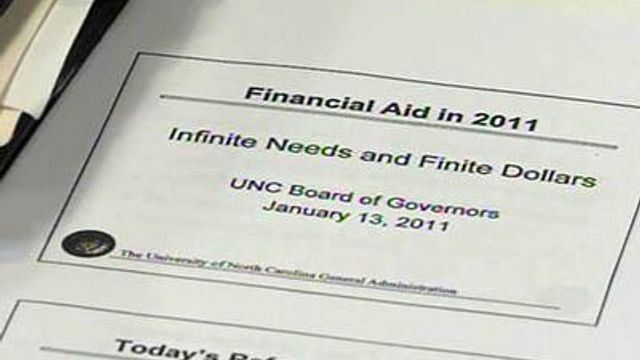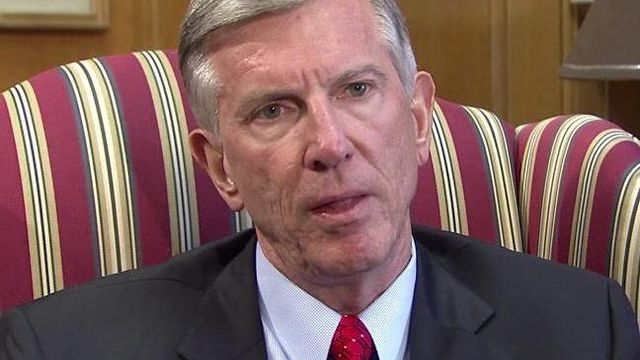More need, less funding squeezes financial aid in UNC system
Thirteen campuses in the UNC system are seeking the maximum possible tuition increase to help offset state budget cuts, putting a larger strain on financial aid programs.
Posted — UpdatedOfficials told the UNC Board of Governors on Thursday that a growing number of students are requesting financial aid because parents have lost jobs in recent months.
At the same time, some sources of aid money are drying up, officials said. For example, the balance in the state escheat fund – unclaimed property turned over to the State Treasurer's Office – dropped by 39 percent in the last four years.
The escheat fund provides more than $116 million a year for financial aid to students at North Carolina universities, which is about 70 percent of the UNC system's overall financial aid revenue. The State Treasurer's Office has projected that the fund won't be a reliable source of revenue for financial aid after 2013.
Last fall, Gov. Beverly Perdue instructed UNC officials to prepare for budget cuts of 5 to 10 percent. Former UNC President Erskine Bowles said that a 10 percent cut would amount to about $300 million and lead to larger classes and fewer instructors and class offerings.
In the past three years, the UNC system has dealt with $600 million in budget cuts, forcing campuses to lay off more than 900 people. All 16 of UNC's university campuses raised tuition last year to help offset the loss of state funding.
New UNC President Tom Ross said tuition will likely go up again this year so that the budget cuts don't harm the quality of education universities can offer.
"There may have to be some tuition increases," Ross said. "The key, I think, is to balance those increases with appropriate levels of financial aid that those students who can't afford to pay will be able to continue their education."
Under UNC system rules, tuition increases are capped at 6.5 percent a year, although campuses can also generate revenue by raising student fees.
UNC-Chapel Hill, East Carolina University and Fayetteville State University are among the campuses seeking a maximum increase for the 2011-12 school year. North Carolina State University has requested a 6.2 percent increase, and North Carolina Central University is seeking a 5 percent increase.
"I feel like, every singe year, it's tuition increases, tuition increases," said Abby Crownshaw, a senior at UNC-Chapel Hill. "We are working. We are studying. We are trying to do our best, but increasing tuition is not really helping."
The Board of Governors is expected to vote on the proposed increases in February.
Ross has said that he's prepared to tackle the budget problems and has urged state leaders to view education as an investment.
He has stopped short of calling for a tax increase or bond to keep tuition costs down and has said he needs time to learn the system before setting his priorities.
The 17-campus system, which educates approximately 200,000 students, receives 13 percent of the state budget.
Athletics panel proposed
Ross said he plans to form a committee to study best practices when it comes to student athletes. The commitee will be led by ECU Chancellor Steve Ballard, but other members haven't been named.
The panel is in response to problems with academic misconduct at various UNC schools.
Fourteen players on the UNC-Chapel Hill football team missed at least one game last fall because of allegations of improper relationships with sports agents or academic misconduct. ECU also reported academic misconduct to the NCAA, but the sport involved hasn't been named.
• Credits
Copyright 2024 by Capitol Broadcasting Company. All rights reserved. This material may not be published, broadcast, rewritten or redistributed.






